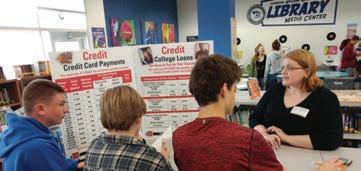
4 minute read
Teaching Financial Literacy In Clarke County
Because life is rarely as simple as A versus B
By Tiffany Ford
Advertisement
Pancake Day Easter Sunday, April 12th 7am till 12 noon 9 S Buckmarsh St., Berryville John H.Enders Fire Company & Rescue Squad If you spend any time on social media you’ve probably seen the meme that drives me crazy. It says something like, “Instead of Algebra, we should be teaching kids how to pay taxes, balance a checkbook and plan for retirement.” I don’t usually let things like this get to me, but this one bothers me every time. As a parent of both a high-school junior and a recent graduate, I know that economics and personal fi nance is a required class. You can’t graduate without passing it. But it’s my understanding that this has been a requirement since the graduating class of 2015. So many people simply don’t know about this requirement.
In addition to this, I am a volunteer through Virginia Cooperative Extension, to provide age-appropriate fi nancial education simulations to students, in order to give them better tools to make good choices with their own money. In fact, last fall Clarke County became the fi rst school district in the region to offer the thirdgrade program.
These programs go by various names, and with the exception of age-appropriate content, they all are run in essentially the same way. For younger students, there are in-class lessons leading up to the event. These in-class lessons teach the key lessons needed to understand fi nances and navigate the simulation. High-school students, who have already learned these key concepts, have an orientation directly before the event. Students are assigned a career for the simulation, and based on that career they are assigned a salary to live on for one month. Next, students are re
Pancakes, Sausage, Eggs, Sausage Gravy, Baked Apples, Coffee, Milk, Hot Tea Apple & Orange Juice
Adults $8 Children $4 Children under six eat FREE
For Information Call 540-955-1110 or visit www.endersfire.com
quired to visit a variety of stations to see what it is like to support a household.
For the eighth-grade program stations are: • Chance • Childcare • Clothing • Communications • Contributions • Credit & College Loans • Entertainment • Financial Advice • Finish Line • Food • Housing • Insurance • Transportation


• Utilities
To keep the content age-appropriate, third-grade students select their career at random from an envelope and are given play money instead of a checkbook register. Highschool students choose their own career and receive a salary based on a reasonable average for that fi eld in their local area. Elementary-school students simulate as single adults, and base their choices on a single income, while high-school students may be single, married, or divorced.
On the day of the simulation, volunteers are briefed before the students arrive. Volunteers are encouraged to give students their options and let them make their own choices. For example, at the housing station, a student may have the option of a four-bedroom house versus a town

house or apartment. These options may allow pets or not, based on the size of the property and whether or not it has a yard.
At the food station, choices include eating out, brand-name groceries, generic groceries. Some students visit transportation early, and buy a luxury car or a sports car, only to later fi nd that they need to trade their car in for public transportation in order to cover their other living expenses. In essence, our students are given a glimpse into what life is like when you have household expenses. During the event, students are required to visit every station at least once, and are permitted to come back to a station and make an exchange if they run out of money; or put more into savings if they fi nd they have extra at the end of the “month.” Students are encouraged to use creative solutions, and that, for me, is my favorite part of the process. I love the look on a student’s face when they realize their options may not be limited to “a or b,” but to an alternative solution that the folks who wrote the curriculum didn’t think of — an option that may work in the real world. Life is rarely as simple as “a or b,” and confi ning students to such options limits their ability to use creative problem-solving. Volunteers are given some leeway during the simulation to allow a variety of solutions, provided they seem realistic. Of course, I can’t predict what those solutions will be; I prefer to wait and see what the students come up with on their own.
All of these programs are offered through collaboration with Virginia Cooperative Extension, Family & Consumer Sciences, and the local 4H program. The next Real Money Real World simulation for eighth grade is scheduled for April 2 at Johnson-Williams Middle School. There is also a Reality Store scheduled for Clarke County High School, April 29, at Lord Fairfax Community College.
To volunteer, contact Karen Poff, extension agent for Family and Consumer Sciences, at kpoff@vt.edu.org 540-635-4549.
For more information about 4-H programs, contact Claudia Lefeve, extension agent, 4-H Youth Development, 540-955-5164, cmybarra@vt.edu.








